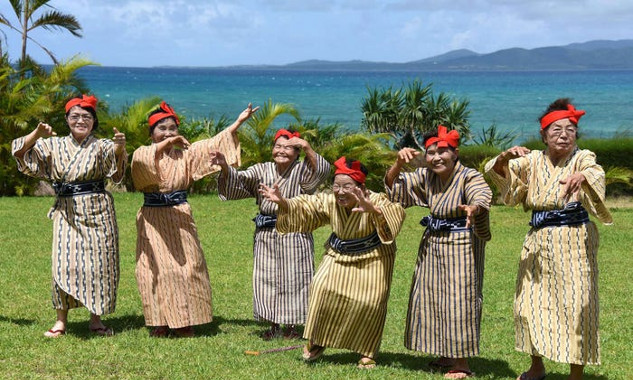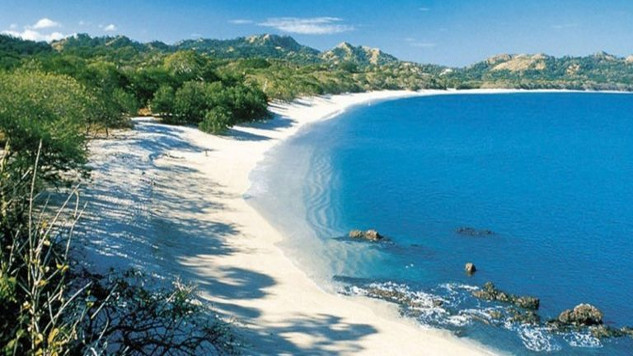
In specific distinct locations worldwide, individuals enjoy extended lifespans that frequently reach well into their 90s and beyond. Notably, these regions have a lower prevalence of chronic illnesses that are more common in other areas.
Referred to as "Blue Zones," a name attributed to writer and researcher Dan Buettner, these unique communities offer vital lessons that could enhance healthcare practices globally, regardless of a region's level of development.
By studying these exceptional communities' cultural and lifestyle factors, we stand to gain crucial knowledge that could inform more effective, holistic healthcare solutions.
What Are The Blue Zones?
The concept of the Blue Zones emerged from an ambitious quest to understand the secrets behind longevity and robust health. These are not just places on a map but vibrant ecosystems of well-being shaped by common lifestyle choices and community traits.
After extensive analysis and multiple on-the-ground investigations, five areas have been identified as Blue Zones: Okinawa in Japan, Sardinia in Italy, the Nicoya Peninsula in Costa Rica, Ikaria in Greece, and Loma Linda in California, USA.
These distinct regions are known for having an extraordinary number of individuals who live to 100 or beyond, and they also demonstrate reduced incidences of chronic conditions like cardiovascular issues, diabetes, and obesity.
What's intriguing about these zones isn't just their statistical outliers; they offer universally applicable lessons. Despite their diverse geographical and cultural settings, shared themes emerge across these regions:
* People here maintain active lifestyles, usually integrated into daily routines rather than formal exercise plans.
* Their eating habits lean toward plant-based diets, high in antioxidants and low in processed items.
* A tight-knit community and social bonds are also prevalent, emphasizing familial and social interactions.
* While healthcare models in these zones differ, the overarching approach leans toward prevention over treatment, underlining the significance of lifestyle decisions in influencing health.
Okinawa, Japan: The Island of Centenarians

Okinawa, a picturesque archipelago south of Japan's mainland, has captured global attention for its extraordinary number of centenarians. Life expectancy here surpasses the global average, making it an intriguing focus of study for scientists and health experts.
A remarkable aspect of Okinawan longevity is their holistic approach to life, encapsulated in the "Hara Hachi Bu philosophy." This practice urges people to eat only until they are 80% full, promoting mindfulness in consumption. The cornerstone of their long life is their eating patterns.
As the world confronts rising levels of weight issues and diseases related to lifestyle choices, the practices observed in Okinawa provide implementable solutions. Think about the transformative effect of incorporating the "Hara Hachi Bu" philosophy into global healthcare and wellness programs. This would prompt individuals to pay closer attention to their satiety levels, preventing overconsumption.
Prioritizing diets rich in plant foods, akin to those seen in Okinawa, could be a key component in shaping public health initiatives. Adopting such nutritional approaches could not only alleviate healthcare costs by lowering obesity rates and related health complications but also elevate the overall quality of life for countless individuals. In this context, the Okinawan model emerges as an inspiring guideline for achieving enduring health improvements that could be universally implemented.
This nutritional strategy is abundant in vital nutrients and maintains a lower caloric intake. This eating pattern has been associated with decreased occurrences of widespread health concerns such as weight gain, heart-related conditions, and elevated sugar levels.
Sardinia, Italy: The Mediterranean Oasis

Sardinia, an idyllic Mediterranean island, is celebrated not just for its picturesque vistas and ancient history but also for the remarkable longevity of its residents. Men on the island often live past the century mark, a unique trend that has sparked scientific interest.
The cornerstone of their long life is their eating patterns. Standard fare in Sardinia includes a wealth of whole grains, diverse fruits, vegetables, and fatty fish like sardines, rich in crucial omega-3 fatty acids with anti-inflammatory advantages. This balanced and nutrient-packed eating approach is linked with a lower frequency of chronic diseases, playing a role in the extended and more vibrant lives of those who reside in Sardinia.
In a healthcare environment that often prioritizes treatment over prevention, the lifestyle choices observed in Sardinia offer valuable lessons for a transformative approach to health. By spotlighting Mediterranean dietary patterns, which include ample plant-based foods and sources of omega-3s, we could usher in a new era of healthcare practices worldwide.
Envision a scenario where medical practitioners and policymakers equally prioritize prevention and treatment. Encouraging individuals to adopt a Mediterranean-like diet and partake in outdoor physical activities, much like the people of Sardinia, could substantially reduce the prevalence of diseases related to lifestyle choices. Such a directional shift can lengthen lifespans, minimize healthcare expenditure, and enhance overall well-being, reaching far beyond the scenic landscapes of Sardinia.
The Nicoya Peninsula, Costa Rica: The Tropical Paradise

Nestled in the heart of Costa Rica, the Nicoya Peninsula serves as a living testament to the power of lifestyle choices on longevity. This tropical paradise has been studied intensively for its remarkable population of centenarians. Inhabitants credit their extended lifespans to various elements, the most significant being a tight-knit community, consistent physical exertion, and a wholesome diet.
Most locals are engaged in agricultural activities, which ensures they stay physically agile and fosters social interactions. Their diet, rich in legumes, whole grains, and fresh produce, hits the sweet spot for nutrition and longevity. This blend of natural physical exercise and communal living fosters longer lives and healthier ones, enriched by a sense of belonging and purpose.
The Nicoya Peninsula's approach to longevity offers an actionable model for tackling two of the most pressing healthcare concerns: mental health issues and chronic diseases. Their healthcare system is where community-based initiatives are not an afterthought but the foundation.
Hospitals and healthcare centers could foster community gardens, encouraging locals to grow food and engage in physical activity. Healthcare professionals could lead outdoor group activities that serve the dual purpose of exercise and social interaction. Initiatives focused on community engagement could contribute to physical and emotional health, diminishing the frequency and intensity of long-term medical conditions and psychological challenges.
A more comprehensive healthcare strategy could be established by emphasizing social interaction and regular exercise, enhancing the quality of care for numerous people.
Ikaria, Greece: The Island Where People 'Forget to Die'

Ikaria, Greece, often called "The Isle Where Aging is Almost Forgotten," is an example of how lifestyle choices influence how long and well we live. Situated in the Aegean Sea, this scenic island boasts a relaxed life intertwined with rich social interactions.
The Ikarian model provides actionable insights that could dramatically alter how mental health care is approached globally. Picture mental health programs where community engagement is actively encouraged to provide a supportive network that enhances mental resilience. Alongside this, stress management could take a page from the Ikarian book, introducing relaxation techniques and mindfulness practices that align with the island's laid-back ethos.
These lifestyle adaptations could be integrated into mental health interventions to promote cognitive and emotional well-being. If the Ikarians are any indicator, these shifts could have profound implications for mental health care, offering a life-affirming blend of community, diet, and peace of mind.
Loma Linda, California, USA: The Spiritual Sanctuary
 Loma Linda, California, is unique in the context of long life expectancy, especially since it's in a developed nation famous for its high-stress lifestyle and frequently poor dietary choices. Distinguishing Loma Linda is its significant concentration of Seventh-day Adventists.
Loma Linda, California, is unique in the context of long life expectancy, especially since it's in a developed nation famous for its high-stress lifestyle and frequently poor dietary choices. Distinguishing Loma Linda is its significant concentration of Seventh-day Adventists.
Members of this faith community not only set aside a day for Sabbath, focusing on relaxation and spiritual contemplation, but they also mainly adhere to a plant-based diet. While many parts of the United States grapple with obesity and lifestyle-related illnesses, Loma Linda's residents seem to dodge these bullets. They abstain from smoking and alcohol consumption, adhering instead to health principles that are deeply ingrained in their faith.
The actionable insight from Loma Linda's example could be revolutionary for modern healthcare systems. Faith-based health initiatives encompassing diet and mental and spiritual well-being could open new avenues in healthcare strategies. These approaches could extend beyond the Seventh-day Adventist community to include other religious and spiritual practices that emphasize holistic health.
The key takeaway is that healthcare doesn't have to be solely about medications and surgeries; it can be an integrative approach incorporating belief systems, making room for spiritual disciplines contributing to physical and mental well-being. This could mean the development of healthcare programs that actively collaborate with faith communities, creating a more holistic approach to well-being.
Bridging the Gap: Developed and Undeveloped World
These Blue Zones offer lessons that could be transformative if integrated into modern healthcare systems. For the developed world, plagued by diseases of affluence like obesity and diabetes, the focus should shift from treatment to prevention. Meanwhile, in the undeveloped world, the community-based approaches observed in Blue Zones could provide a more accessible healthcare model.
The five Blue Zones teach us that longevity is not just a factor of genetics but is significantly influenced by lifestyle choices and community factors. Understanding these patterns can offer actionable insights to improve healthcare outcomes globally. It's not just about adding years to our life but adding life to our years.
Well-being extends beyond medical facilities and prescriptions; it embodies a lifestyle. The lessons from the Blue Zones indicate that occasionally, the most straightforward alterations in our daily lives can yield the most profound improvements in our health.
Related Book: The Blue Zones Secrets for Living Longer
The Blue Zones Secrets for Living Longer: Lessons From the Healthiest Places on Earth
by Dan Buettner. In his latest installment, "The Blue Zones Secrets for Living Longer," Dan Buettner, a National Geographic Explorer and best-selling author, takes us on another enriching journey into remarkable longevity. This beautifully crafted guide, accompanied by striking photography from National Geographic talents like David McLain and Gianluca Cola, explores the heart of these fascinating regions where people live longer and thrive into their later years.
In his latest installment, "The Blue Zones Secrets for Living Longer," Dan Buettner, a National Geographic Explorer and best-selling author, takes us on another enriching journey into remarkable longevity. This beautifully crafted guide, accompanied by striking photography from National Geographic talents like David McLain and Gianluca Cola, explores the heart of these fascinating regions where people live longer and thrive into their later years.
The author revisits familiar terrain in Sardinia, Italy; Ikaria, Greece; Okinawa, Japan; Costa Rica's Nicoya Peninsula; and Loma Linda, California, to check on the extraordinary elders of these communities. His latest findings unveil a fresh, man-made blue zone—a groundbreaking development in his two decades of field research.
The narratives are more than mere geographic adventures; they're a deep dive into the essential elixirs of life—purpose, faith, community, leisure, natural activity, and a diet rich in plants—that add up to as many as 10 extra years of vibrant living. This collection, imbued with breathtaking visuals, serves as a travelogue and an actionable, comprehensive blueprint for enriching our lives, illustrating that the secrets to longevity are often within our reach.
For more info and/or to order this book, click here.
About the Author
 Robert Jennings is the co-publisher of InnerSelf.com, a platform dedicated to empowering individuals and fostering a more connected, equitable world. A veteran of the U.S. Marine Corps and the U.S. Army, Robert draws on his diverse life experiences, from working in real estate and construction to building InnerSelf with his wife, Marie T. Russell, to bring a practical, grounded perspective to life’s challenges. Founded in 1996, InnerSelf.com shares insights to help people make informed, meaningful choices for themselves and the planet. More than 30 years later, InnerSelf continues to inspire clarity and empowerment.
Robert Jennings is the co-publisher of InnerSelf.com, a platform dedicated to empowering individuals and fostering a more connected, equitable world. A veteran of the U.S. Marine Corps and the U.S. Army, Robert draws on his diverse life experiences, from working in real estate and construction to building InnerSelf with his wife, Marie T. Russell, to bring a practical, grounded perspective to life’s challenges. Founded in 1996, InnerSelf.com shares insights to help people make informed, meaningful choices for themselves and the planet. More than 30 years later, InnerSelf continues to inspire clarity and empowerment.
Creative Commons 4.0
This article is licensed under a Creative Commons Attribution-Share Alike 4.0 License. Attribute the author Robert Jennings, InnerSelf.com. Link back to the article This article originally appeared on InnerSelf.com
books_health








